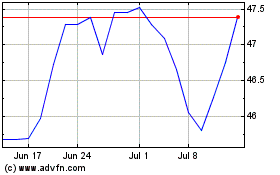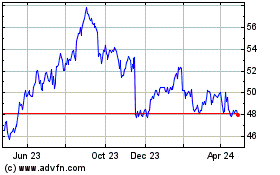In ZTE Battle, U.S. Suppliers Are Collateral Damage
April 24 2018 - 5:59AM
Dow Jones News
By Jay Greene
American companies that supply chips, antennas and other gear to
ZTE Corp. are bracing for a sizable revenue loss after the U.S.
last week said they no longer would be able to sell components to
the Chinese telecommunications giant.
Several ZTE vendors watched their stock prices stumble in recent
days, collateral damage after the Commerce Department put in place
a seven-year ban, as national-security and trade-related tensions
flare up between the U.S. and China. Giants such as San Diego chip
maker Qualcomm Inc. and niche companies such as Acacia
Communications Inc., a Maynard, Mass.-based maker of fiber-optic
networking components, are among U.S. companies affected.
U.S. chip makers sold about $1.5 billion worth of products to
ZTE, according to Handel Jones, chief executive of the technology
consultancy International Business Strategies Inc., which tracks
China's high-tech sector. ZTE made 3.8% of smartphones world-wide
in 2017, he estimates.
The pinch is particularly acute for Acacia, which noted in a
February filing that ZTE accounted for 30% of its $385.17 million
in revenue last year. Acacia, which had 354 employees at the end of
2017, said "the loss or temporary loss of a major customer for any
reason could harm our financial condition."
Acacia, a roughly $1.1 billion company whose stock has slid 31%
since the ban was announced on April 16, said it was "taking steps
to suspend affected transactions and is assessing the impact of
these developments." It declined to comment further.
Qualcomm's shares have tumbled 9%. ZTE contributed between 1.5%
and 2.5% of Qualcomm's $22.3 billion of revenue in 2017, according
to Stacy Rasgon, an analyst at Bernstein Research.
Two years ago, the Commerce Department placed similar export
restrictions on ZTE but quickly suspended them. In a regulatory
filing last May, Xilinx Inc., a San Jose, Calif., maker of
programmable chips, said if those sanctions hadn't been lifted "the
restrictions could have caused a material adverse effect" on its
business.
A spokeswoman said Xilinx, whose shares have fallen 7% since the
ban's announcement, is "obviously aware of the situation and will
be addressing it during our earnings call" Wednesday.
After the ban was announced, ZTE warned the order "will not only
severely impact the survival and development of ZTE, but will also
cause damages to all partners of ZTE including a large number of
U.S. companies."
More than a dozen U.S. companies listed ZTE as a customer in
previous financial filings.
NeoPhotonics Corp. said ZTE directly or indirectly accounted for
4% of the $292.89 million in revenue it posted last year. The San
Jose-based maker of optical gear had been counting on that business
to jump to 5% of annualized revenue. Now those expectations "will
not be realized," the company said in a statement April 17.
Moreover, NeoPhotonics said it is sitting on $1.5 million in
inventory "designated for ZTE" that it will write off. Its shares
have fallen 13% since the ban's announcement.
Oclaro Inc. has said ZTE accounted for 18% of the $600.97
million it posted in fiscal 2017 revenue. The San Jose maker of
optical components is in the process of being acquired by Lumentum
Holdings Inc. in a $1.8 billion transaction.
The Sunnyvale, Calif., memory-chip maker GSI Technology Inc. has
said ZTE "directly or indirectly purchased more than $500,000" of
its products in the previous fiscal year. Skyworks Solutions Inc.,
of Woburn, Mass., has listed ZTE as a "key customer" along with
Amazon.com Inc., Cisco Systems Inc. and Microsoft Corp.
Lumentum and Skyworks representatives declined to comment.
Oclaro and GSI didn't respond to requests for comment.
Corning Inc., which makes screens called Gorilla Glass used in
smartphones from ZTE and others, said it was assessing whether the
order applies to its products made at its factories in Taiwan,
Japan and South Korea. The company said it wasn't sure whether
Gorilla Glass includes content that falls under U.S. export
controls.
"We are continuing to monitor the situation and determine if the
order impacts products made in foreign destinations," spokesman
Daniel Collins said.
A Commerce Department spokesman said ZTE won't be able purchase
goods, software or technology subject to the agency's Export
Administration Regulations, regardless of where they might be
manufactured.
--Ted Greenwald in San Francisco, Liza Lin in Beijing and John
McKinnon in Washington contributed to this article.
Write to Jay Greene at Jay.Greene@wsj.com
(END) Dow Jones Newswires
April 24, 2018 05:44 ET (09:44 GMT)
Copyright (c) 2018 Dow Jones & Company, Inc.
Cisco Systems (NASDAQ:CSCO)
Historical Stock Chart
From Mar 2024 to Apr 2024

Cisco Systems (NASDAQ:CSCO)
Historical Stock Chart
From Apr 2023 to Apr 2024
